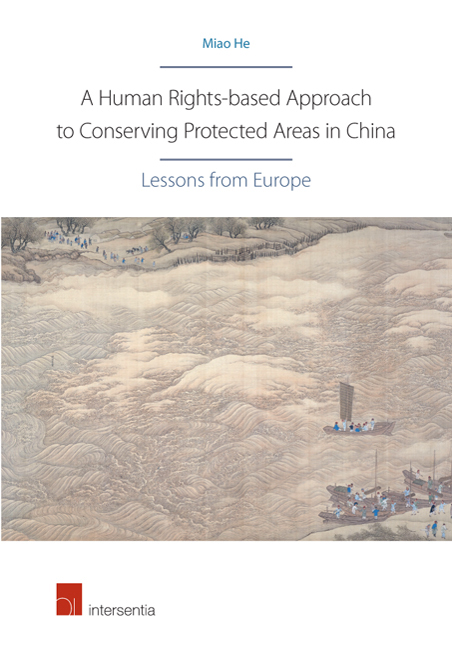Book contents
- Frontmatter
- Contents
- List of Abbreviations
- PART I INTRODUCTION AND BACKGROUND
- PART II ANALYSIS OF THE RELATIONSHIP BETWEEN HUMAN RIGHTS AND PROTECTED AREAS CONSERVATION IN CHINA AND IN EUROPE
- Chapter 3 Protected Areas Conservation in China and in Europe
- Chapter 4 Substantive Right (Right to Property) and Protected Areas Conservation
- Chapter 5 Procedural Rights and Protected Areas Conservation
- Chapter 6 Conclusions for Part II
- PART III IMPLEMENTATION AND GENERAL CONCLUSION
- References
Chapter 4 - Substantive Right (Right to Property) and Protected Areas Conservation
from PART II - ANALYSIS OF THE RELATIONSHIP BETWEEN HUMAN RIGHTS AND PROTECTED AREAS CONSERVATION IN CHINA AND IN EUROPE
Published online by Cambridge University Press: 22 September 2018
- Frontmatter
- Contents
- List of Abbreviations
- PART I INTRODUCTION AND BACKGROUND
- PART II ANALYSIS OF THE RELATIONSHIP BETWEEN HUMAN RIGHTS AND PROTECTED AREAS CONSERVATION IN CHINA AND IN EUROPE
- Chapter 3 Protected Areas Conservation in China and in Europe
- Chapter 4 Substantive Right (Right to Property) and Protected Areas Conservation
- Chapter 5 Procedural Rights and Protected Areas Conservation
- Chapter 6 Conclusions for Part II
- PART III IMPLEMENTATION AND GENERAL CONCLUSION
- References
Summary
As we have seen in the introduction (see 1.1.4), there can be strong linkages between halting the ongoing loss of biodiversity through protected areas, improving human livelihoods, and ensuring peoples’ rights. The right to property is among the human rights most prone to be affected by nature conservation. In most cases, property rights have played a decisive role in determining whether communities would be involved in proposed conservation and environmental projects. Indeed, to secure the right to property is a precondition to the effective enjoyment of core human rights, for instance the right to life and the right to respect private and family life, home, and correspondence. A system of land tenure that acknowledges different layers of use, access, control, and ownership and accommodates both traditional indigenous system of land tenure alongside modern property rights is the starting point in the process of recognition and inclusion of stakeholders in decisions pertaining to land and related resources. As for the local people and communities, the essence of property to land is not the possession of a physical piece of land per se, but the right to live offthe land, and enjoy the benefit stream it provides.
RELATIONSHIP BETWEEN THE RIGHT TO PROPERTY AND PROTECTED AREAS
Man may possess such things as are appropriate to preserve himself and satisfy his needs; it is over these things that his right to liberty is exercised in all its fullness, this is called property. At a more fundamental level, the property laws raise issues of what can be “owned” and what “ownership” entails. More specifically, property laws are the legal concepts that most strongly enshrine the view that economic wealth, freely pursued through the free use and enjoyment of natural resources, will provide for both individual and the so-called net social benefit, or common good.
GENERAL RIGHT TO PROPERTY IN INTERNATIONAL AND REGIONAL HUMAN RIGHTS INSTRUMENTS
The Universal Declaration of Human Rights includes the right of everyone to own property alone as well as in association with others, and in Article 17, it adds that “no one shall be arbitrarily deprived of his property.”
- Type
- Chapter
- Information
- A Human Rights-based Approach to Conserving Protected Areas in ChinaLessons from Europe, pp. 117 - 168Publisher: IntersentiaPrint publication year: 2016



